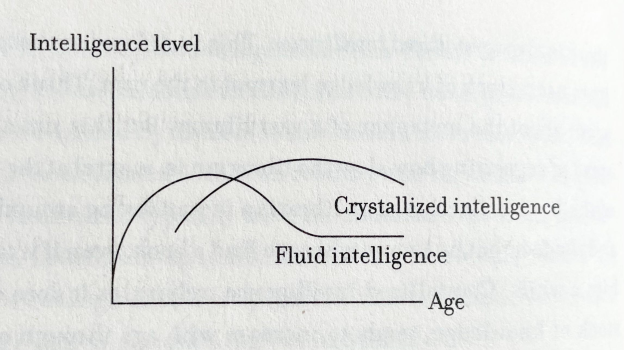I recently read “From Strength to Strength” by Arthur C. Brooks and rarely has a book talked to me as directly as this important effort.
I realized after reading this book that I’ve been a striver for as long as I can remember, pushing myself to achieve and enjoy professional success. I was the star student of mathematics at university and then successfully completed my PhD in mathematics in a little over three years.
My professional career saw me climbing the corporate ladder, ultimately becoming one of six Director-level folks leading up the software development arm of a US$300m+ software business. When my 21-year stint at Quest came to an abrupt and unexpected end, I took some time to reset and ultimately started my own consultancy to continue on with my professional life in testing.
An important idea in the book is the difference between fluid and crystallized intelligence. In essence, fluid intelligence is your ability to process new information, learn and solve problems, while crystallized intelligence is the ability to use a stock of knowledge learned in the past.
This diagram illustrates how these types of intelligence generally change as we age:

Brooks makes this observation, which struck a very strong chord with me:
“If you are experiencing decline in fluid intelligence – and if you are my age, you are – it doesn’t mean you are washed up. It means it is time to jump off the fluid intelligence curve and onto the crystallized intelligence curve. Those who fight against time are trying to bend the old curve instead of getting onto the new one. But it is almost impossible to bend, which is why people are so frustrated, and usually unsuccessful.”
I’ve witnessed older members of the testing community in Melbourne struggling with this as they try to fight against time and stay relevant in ways that really don’t make sense. I’m realizing I’ve naturally been shifting my focus to crystallized intelligence, out of necessity but also it’s where I get more fulfilment.
Brooks makes the point that:
“when you are young, you have raw smarts; when you are old, you have wisdom. When you are young, you can generate lots of facts; when you are old, you know what they mean and how to use them.”
He notes the inevitably of decline but also the hope that shifting perspective can bring with it new and exciting opportunities later in life:
“Almost without fail, you will notice the decline in the fluid intelligence portion. However, there always exists the ability to redesign your career less on innovation and more on instruction as the years pass, thus playing to your strengths with age.”
I recognize that I can no longer keep up with the younger folks in many ways, I have less and less interest in the latest tools and tech, and being on the critical path in day-to-day project work doesn’t bring me joy. But I’m finding my niche in helping to guide folks with my accrued wisdom:
“So what do the young hotshots need? Old people on product teams, old people in marketing, and old people in the C-suite. They need not just whiz-bang ideas but actual wisdom that only comes with years in the school of hard knocks.”
Brooks notes:
“Practiced properly, old people have an edge over younger people, because they have more experience at life and relationships”
and he also quotes the philosopher Marcus Tullius Cicero who:
“…believed three things about older age. First, that it should be dedicated to service, not goofing off. Second, our greatest gift later in life is wisdom, in which learning and thought create a worldview that can enrich others. Third, our natural ability at this point is counsel: mentoring, advising and teaching others, in a way that does not amass worldly rewards of money, power or prestige.”
I’m certainly finding a lot of enjoyment and fulfilment from my mentoring activities, there’s no frustration there and it’s probably a sign of already spending some or most of my time exploiting crystallized intelligence:
“The decline in your fluid intelligence is a sign that it is time not to rage, which just doubles down on your unsatisfying attachments and leads to frustration. Rather, it is a time to scale up your crystallized intelligence, use your wisdom, and share it with others.”
I think my mindfulness practice over the last few years has helped here too (and is also mentioned by Brooks in his book) and I’ve become much more comfortable showing vulnerability. I have no issue with saying “I don’t know” and feel no need for pretence – and have found in doing so that people generally seem to see me as more credible, rather than less:
“To share your weakness without caring what others think, is a kind of superpower”
The cool work of Chip Conley and his Modern Elder Academy gets a well-deserved shout out here too.
This is an important book and especially so for those of us later in our careers as we look for new meaning and ways to find satisfaction from sharing, teaching and so on. It’s a great read and a handy nudge to follow a different path – not better or worse, but one befitting our wisdom and also likely to be more fulfilling. As Brooks notes:
“Get old sharing the things you believe are most important. Excellence is always its own reward, and this is how you can be most excellent as you age”
I’d love to help more people so please check out the mentoring services I offer through my consultancy business, Dr Lee Consulting.

